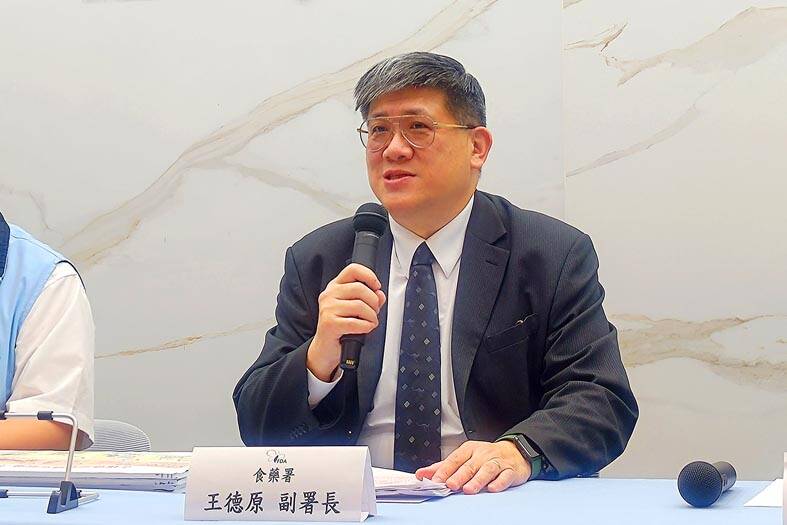The Food and Drug Administration (FDA) yesterday said it would hold a meeting today to discuss whether emergency contraception should be made available as an over-the-counter drug in Taiwan.
This is as part of a push by the government to protect women’s autonomy, which would make emergency contraception, also known as “the morning after pill,” available without a prescription, officials said.
The FDA yesterday said it would invite medical experts, children’s rights representatives, women’s groups, members of the Ministry of Education and other parties to share their opinions on the issue and find a consensus.

Photo: Chiu Chih-jou, Taipei Times
To protect women’s autonomy and medical privacy, emergency contraceptive should be changed from a prescription drug to an over-the-counter drug, Taiwan People’s Party Legislator Lin Yi-chun (林憶君) said at the Legislative Yuan on Tuesday.
Premier Cho Jung-tai (卓榮泰) said that he would order the Ministry of Health and Welfare to consult with medical professionals as soon as possible, and Minister of Health and Welfare Chiu Tai-yuan (邱泰源) confirmed that the FDA would hold a meeting today.
In 2016, the FDA proposed changing emergency contraception’s status from a prescription drug to an over-the-counter drug, but suspended its plans after fierce debate.
The FDA’s proposal at the time included restrictions on emergency contraceptive, such as only being allowed for those older than 17 and prohibiting advertisement.
At the time, the Taiwan Association of Obstetrics and Gynecology wrote a letter expressing its firm disagreement with the policy change.
In today’s meeting, the FDA would consider not only the medical implications of changing emergency contraception’s status, but also the societal consensus of such a change, FDA Deputy Director-General Wang Der-yuan (王德原) said yesterday.
As such, the meeting would see both medical experts as well as representatives from civil society groups participate, Wang added.

The manufacture of the remaining 28 M1A2T Abrams tanks Taiwan purchased from the US has recently been completed, and they are expected to be delivered within the next one to two months, a source said yesterday. The Ministry of National Defense is arranging cargo ships to transport the tanks to Taiwan as soon as possible, said the source, who is familiar with the matter. The estimated arrival time ranges from late this month to early next month, the source said. The 28 Abrams tanks make up the third and final batch of a total of 108 tanks, valued at about NT$40.5 billion

Two Taiwanese prosecutors were questioned by Chinese security personnel at their hotel during a trip to China’s Henan Province this month, the Mainland Affairs Council (MAC) said yesterday. The officers had personal information on the prosecutors, including “when they were assigned to their posts, their work locations and job titles,” MAC Deputy Minister and spokesman Liang Wen-chieh (梁文傑) said. On top of asking about their agencies and positions, the officers also questioned the prosecutors about the Cross-Strait Joint Crime-Fighting and Judicial Mutual Assistance Agreement, a pact that serves as the framework for Taiwan-China cooperation on combating crime and providing judicial assistance, Liang

A group from the Taiwanese Designers in Australia association yesterday represented Taiwan at the Midsumma Pride March in Melbourne. The march, held in the St. Kilda suburb, is the city’s largest LGBTQIA+ parade and the flagship event of the annual Midsumma Festival. It attracted more than 45,000 spectators who supported the 400 groups and 10,000 marchers that participated this year, the association said. Taiwanese Designers said they organized a team to march for Taiwan this year, joining politicians, government agencies, professionals and community organizations in showing support for LGBTQIA+ people and diverse communities. As the first country in Asia to legalize same-sex

MOTIVES QUESTIONED The PLA considers Xi’s policies toward Taiwan to be driven by personal considerations rather than military assessment, the Epoch Times reports Chinese President Xi Jinping’s (習近平) latest purge of the Chinese People’s Liberation Army (PLA) leadership might have been prompted by the military’s opposition to plans of invading Taiwan, the Epoch Times said. The Chinese military opposes waging war against Taiwan by a large consensus, putting it at odds with Xi’s vision, the Falun Gong-affiliated daily said in a report on Thursday, citing anonymous sources with insight into the PLA’s inner workings. The opposition is not the opinion of a few generals, but a widely shared view among the PLA cadre, the Epoch Times cited them as saying. “Chinese forces know full well that